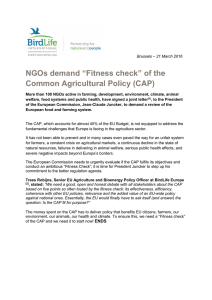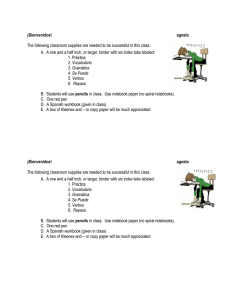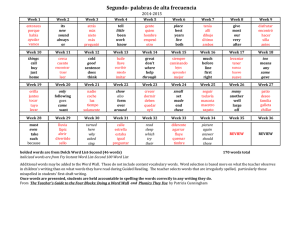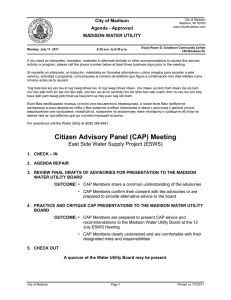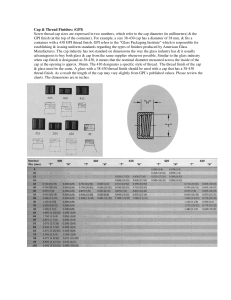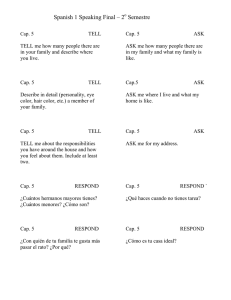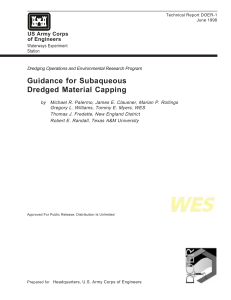Intermediate Spanish II - Southern Methodist University
Anuncio
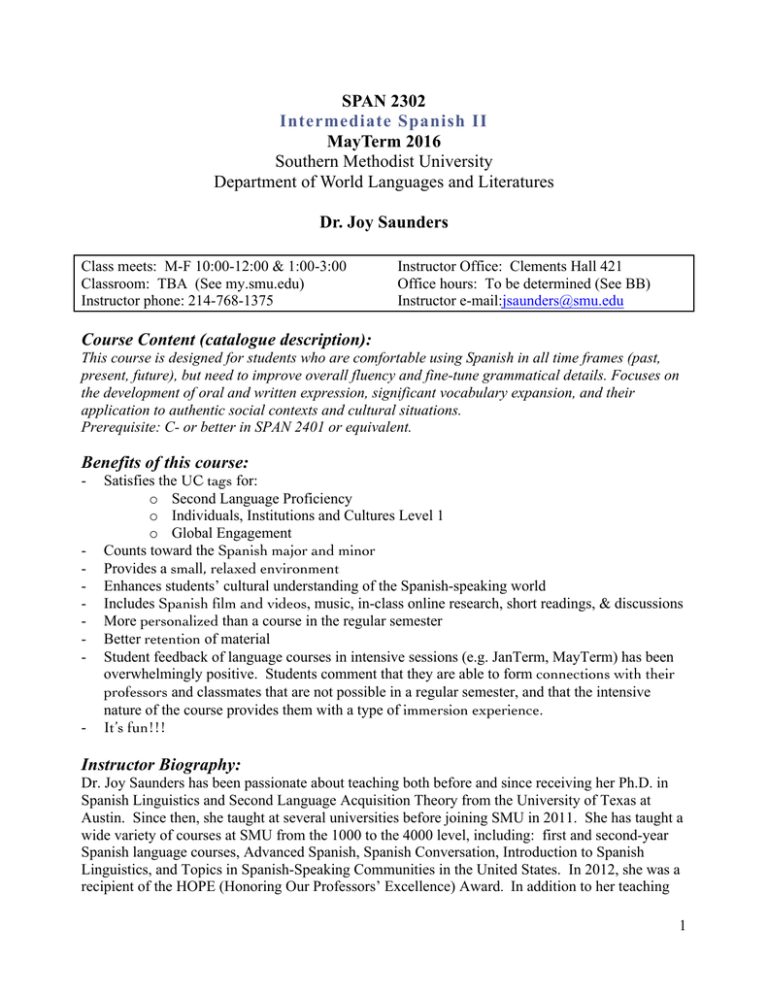
SPAN 2302 Intermediate Spanish II MayTerm 2016 Southern Methodist University Department of World Languages and Literatures Dr. Joy Saunders Class meets: M-F 10:00-12:00 & 1:00-3:00 Classroom: TBA (See my.smu.edu) Instructor phone: 214-768-1375 Instructor Office: Clements Hall 421 Office hours: To be determined (See BB) Instructor e-mail:[email protected] Course Content (catalogue description): This course is designed for students who are comfortable using Spanish in all time frames (past, present, future), but need to improve overall fluency and fine-tune grammatical details. Focuses on the development of oral and written expression, significant vocabulary expansion, and their application to authentic social contexts and cultural situations. Prerequisite: C- or better in SPAN 2401 or equivalent. Benefits of this course: - Satisfies the UC tags for: o Second Language Proficiency o Individuals, Institutions and Cultures Level 1 o Global Engagement - Counts toward the Spanish major and minor - Provides a small, relaxed environment - Enhances students’ cultural understanding of the Spanish-speaking world - Includes Spanish film and videos, music, in-class online research, short readings, & discussions - More personalized than a course in the regular semester - Better retention of material - Student feedback of language courses in intensive sessions (e.g. JanTerm, MayTerm) has been overwhelmingly positive. Students comment that they are able to form connections with their professors and classmates that are not possible in a regular semester, and that the intensive nature of the course provides them with a type of immersion experience. - It’s fun!!! Instructor Biography: Dr. Joy Saunders has been passionate about teaching both before and since receiving her Ph.D. in Spanish Linguistics and Second Language Acquisition Theory from the University of Texas at Austin. Since then, she taught at several universities before joining SMU in 2011. She has taught a wide variety of courses at SMU from the 1000 to the 4000 level, including: first and second-year Spanish language courses, Advanced Spanish, Spanish Conversation, Introduction to Spanish Linguistics, and Topics in Spanish-Speaking Communities in the United States. In 2012, she was a recipient of the HOPE (Honoring Our Professors’ Excellence) Award. In addition to her teaching 1 responsibilities, she currently serves as Coordinator of the 2000-level Spanish courses. Student Learning Outcomes for Second Language Proficiency: Listening Speaking Reading Writing Students will demonstrate ability to understand the main facts and some supporting details of short narrative and descriptive speech on familiar topics. Students will demonstrate ability to converse effectively when dealing with familiar tasks and social situations. They can narrate and describe in a variety of time frames using connected discourse of paragraph length. Students will demonstrate ability to understand the main facts and some supporting details of short narrative and descriptive texts on familiar topics. Students will demonstrate ability to narrate and describe in a variety of time frames using connected discourse of paragraph length. Student Learning Outcomes for Individuals, Institutions and Cultures Level 1: 1. Students will be able to identify the types of interactions and influences that arise between or among individuals, institutions, and cultures that shape economic, political and social experiences. 2. Students will be able to summarize basic empirical phenomena in the study of individuals, institutions, and cultures that shape economic, political and social experiences. Student Learning Outcomes for Global Engagement: Students will be able to demonstrate an understanding of the material culture, underlying values, beliefs, or practices that are central to the culture(s) being visited or studied. Additional Course Objectives: Vocabulary Grammar Culture Listening Speaking Reading Writing Upon completion of the semester a successful student… will have acquired a more diverse and elaborate vocabulary pertaining to authentic social contexts and cultural situations. S/he will have intensified strategies for inference of meaning and will have the ability to express himself/herself without referencing English (synonyms, antonyms, definitions). will have acquired the structures necessary to form and use the seven communicative functions (i.e. describing, comparing, reacting and recommending, narrating, discussing likes and dislikes, creating hypotheses, and talking about the future) with significantly improved grammatical accuracy and complexity. will be able to express his/her sensitivity toward and appreciation of various aspects of Spanishspeaking cultures through comparisons and contrasts. S/he will be able to express a critical view of a certain cultural or social aspect of the Spanish-speaking world. will display more accuracy in his/her comprehension in general and will improve his/her ability to understand authentic materials (film, radio, etc.). will be able to engage in extended discourse and substantially elaborate a topic. S/he will have achieved a better flow and his/her speech will be relatively spontaneous and cohesive through the usage of transitions and connectors. Pronunciation errors will have been significantly reduced. will be able to read relatively complex texts from a variety of genres (literary, journalistic, historical, etc.) by means of developing reading strategies such as deciphering the words based on context, relating them to the words they know (words families), and visualizing the content of the text. will be able to independently produce a well-structured essay that incorporates a critical point of view and a well-developed thesis and argument, with topics pertaining to social and cultural issues as the basis. 2 Course Materials: Connect Plus with LearnSmart (with digital WBLM) Access Card for Punto y aparte, 5th ed. Sharon W. Forester and Anne Lambright. 2015. New York, NY: McGraw-Hill (instructor will provide details). Your Connect Plus account includes an electronic textbook as well as online homework assignments. Your Connect Plus access card also entitles you to purchase a loose-leaf copy of the textbook from the publisher for a significant discount. You are encouraged to take advantage of this offer. Course Assessment: Course Components Connect (online workbook) Quizzes (3) Attendance, Participation, Preparation, Courtesy, and miscellaneous assignments Exam 1 Exam 2 Final Exam Oral / Cultural Presentation TOTAL % 10 10 10 20 20 20 10 100 Grading Scale: Outstanding work receives an A; outstanding work far exceeds what is expected (superior). A = 93-100 A- = 90-92 Excellent work receives a B; excellent work exceeds what is expected (above average). B+ = 87-89 B = 83-86 B- = 80-82 Good work receives a C; good work basically meets expectations (average). C+ = 77-79 C = 73-76 C- = 70-72 Acceptable work receives a D; acceptable work is not particularly good, but is not failing (below average). D+ = 67-69 D = 63-66 D- = 60-62 Unacceptable work receives an F; unacceptable work demonstrates poor effort and/or understanding (failing). F = 59 and below Description of Course Components: 1) Connect: Connect is the online workbook. Your instructor will provide you with a course code that is unique to your section of SPAN 2303 and will provide you with instructions for registering for SPAN 2302 on Connect. If you did not purchase an access card from the bookstore, your instructor will provide you with instructions for purchasing your access code online at the same time that she provides you the course code for your section of SPAN 2302. Connect assignments are due at 11:59pm on the due date indicated on the course schedule. 3 2) Quizzes: Three quizzes (Ch.1, Ch. 3, & Ch.5) are built into the syllabus. These quizzes will be approximately 15 minutes in length. 3) Attendance, Participation, Preparation & Courtesy: All students are expected to attend, arrive on time, arrive prepared and participate actively in class and group discussions, using Spanish. Each hour of absence will lower the student’s Attendance/Preparation/Participation/Courtesy grade by 10 percentage points, unless the absence is excused. For example, if a student misses one hour of class, the highest grade possible in that category is a 90%. Students are expected to be respectful of the classmates, the instructor and the learning process in general. Cell phones and improper mannerisms interfere with that principle as do tardies, early departures and regularly leaving and re-entering the classroom while class is in session. Being unprepared or discourteous, using English excessively, and not fully participating in class will result in a lowering of the grade in this category. 4) Exams: • Exams: There will be two exams during the semester. Exam #1 will cover Chapters 1 & 2. Exam #2 will cover Chapters 3 & 4. These exams will focus on vocabulary, grammar, culture, and writing. They will contain material from the textbook and other assigned materials, as well as from class discussions. • Final Exam: The final exam is cumulative (i.e. it covers all the material covered throughout the semester, i.e. Chapters 1-6.). It will test listening comprehension, vocabulary, grammar, reading comprehension, culture and writing. 5) Oral / Cultural Presentation: The oral / cultural presentation will consist of a video that you will upload to Blackboard. The video will be a monologue in Spanish in which you reflect on the cultural information that you learned during the semester. You will be expected to demonstrate an understanding of the underlying values, beliefs, and practices of the Spanish-speaking world, in addition to demonstrating an ability to accurately use the vocabulary and grammar focused on during the semester. Specific guidelines and criteria will be provided by the instructor. Academic Dishonesty: According to University regulations and the SMU Honor Code, dishonesty in connection with any university activity constitutes misconduct for which students may be subject to administrative action or disciplinary penalties. Cheating, plagiarism, or knowingly furnishing false information are examples of dishonesty. Instances of cheating include, but are not limited to: handing in work done by someone else as your own (in paper or electronic form), handing in writing samples in Spanish that have been translated or edited by someone else or processed through a language translator, copying from websites, assisting others in cheating, failing to cite sources, etc. While in this course collaboration on assignments is encouraged, individual work must be demonstrated. This means that all written assignments as well as other types of assignments must be the original work of the student turning them in. Any work that is either partially or fully copied, plagiarized or that is the result of academic dishonesty will result in a grade zero for that work. 4 Disability Accommodations: Students needing academic accommodations for a disability must first register with Disability Accommodations & Success Strategies (DASS). Students can call 214-7681470 or visithttp://www.smu.edu/Provost/ALEC/DASS to begin the process. Once registered, students should then schedule an appointment with the professor as early in the semester as possible, present a DASS Accommodation Letter, and make appropriate arrangements. Please note that accommodations are not retroactive and require advance notice to implement. Placement Test Results: After taking the placement test at SMU, every student must print out his/her results and turn the placement test results in to her Spanish instructor the first day of class. The printout should indicate the date and time you took the test, your score and the level in which you placed. The instructor will use the results to make sure the student is accurately placed. The instructor has the right to disallow you from taking the class if s/he does not have your results. Make-ups and Late Work: Make-up exams will be allowed and late work accepted only and exclusively in the event of documented excused absences. Written proof of an excused absence must be submitted immediately upon return to class in the event of an illness or prior to a class missed due to religious observance or extracurricular activity. If the student is absent on the day of the quiz or when any other assignment is due, s/he will receive a grade of zero on that work unless the absence is excused. Assignments turned in at the end of the class or after class will also be treated as late work and will not be accepted unless adequate documentation is provided. Excused Absences: Health: Verification of medical illness and request for an excused absence from class will be handled in one of two ways. A physician or staff member from health/counseling and testing will provide either (1) a hand-written note on a Health Center prescription form, or (2) a signed letter written on Health Center stationery. Excused medical absences shall have specific dates or time periods indicated. Encounter forms, walk-out statements, and the form titled “Explanatory Statement for Absence from Class” verify a student’s visit to the Health Center but do not indicate an excused medical absence. Religious Observance: Religiously observant students wishing to be absent on holidays that require missing class should notify their instructors in writing at the beginning of the semester, and should discuss with them, in advance, acceptable ways of making up any work missed because of the absence. (See University Policy No. 1.9.) University Extracurricular Activities: Absences related to an officially sanctioned, scheduled University extracurricular activity need to be verified by an Academic Compliance form signed by your coach or activity sponsor. You will be given the opportunity to make up class assignments or other graded assignments missed as a result of your participation, but it is your responsibility to make arrangements with your instructor prior to any missed scheduled examination or other missed assignment for making up the work. 5 Course Calendar 1: (assignments and class topics subject to change) Day/Date Session Class Topic / pages Chapter Assignments Introducción al curso Thurs. May 12 Connect Sign-up 10-12 Cara a cara (pp.2-5) Para empezar Puntos clave (pp.6-14 selecciones) Capítulo 1: Perspectivas Percepciones e impresiones 1-3 Diálogo / Vocabulario (pp.16-24) Cap.1 Puntos clave -- Descripción y comparación (pp.25-32) Connect: Preliminar due by 11:59pm May 12 Más práctica con el vocabulario (pp.16-24) Fri. May 13 10-12 1-3 Más práctica con la descripción y la comparación Lugares fascinantes: España (Barcelona; Sevilla; Toledo; Bilbao) (pp.34-36) La cultura de España: -- Un artista hispano: Santiago Calatrava (pp.37-38) -- La música española (p.39) -- Un evento histórico: La Guerra Civil española (p.40) -- … Cap.1 Cap.1 Connect: Cap.1 due by 11:59pm Sunday May 15 Lectura: Salvador Dalí: La novela de su vida (pp.41-44) Prueba – Cap.1 (15 min.) 1 The instructor reserves the right to make modifications (deletions or additions) to the syllabus as she deems necessary. Changes will be announced in class &/or by email or Blackboard. If you are absent, it is your responsibility to find out if additional/alternate assignments were given and to be prepared for the following class. Absence from class does not excuse from being prepared for the following class. 6 Day/Date Session Class Topic / pages Chapter Assignments Capítulo 2: Conexiones Nuestras raíces Mon. May 16 10-12 Diálogo / Vocabulario (pp.47-54) Cap.2 Puntos clave – Narración en el pasado (pp.56-61) Más práctica con el vocabulario (pp.4754) Más práctica con la narración en el pasado 1-3 Tues. May 17 10-12 Lugares fascinantes: El Caribe (La Habana, Cuba; San Pedro de Macorís, República Dominicana; El Viejo San Juan, Puerto Rico; Mérida, Venezuela) (pp.64-68) La cultura del Caribe: -- Un artista hispano: Gustavo Dudamel (pp.69-70) -- La música caribeña (p.71) -- Un evento histórico: La Revolución cubana (p.72) -- … Cap.2 Connect: Cap.2 due by 11:59pm May 16 Cap.2 Repaso 1-3 Examen #1 (Cap. 1-2) Cap.1-2 Capítulo 3: Pasiones y sentimientos: Las relaciones humanas Wed. May 18 10-12 Diálogo / Vocabulario (pp.82--90) Cap.3 Puntos clave – Reacciones y recomendaciones (pp.92-98) Lugares fascinantes: México (Guanajuato; México D.F.; Yucatán; Oaxaca) (pp.100-103) 1-3 Lectura: Peregrina (pp.108-113) Más práctica con el vocabulario (p.82-90) Cap.3 Connect: Cap.3 due by 11:59pm May 18 Más práctica con las reacciones y recomendaciones 7 Day/Date Thurs. May 19 Session 10-12 1-3 Class Topic / pages La cultura de México: -- Un artista hispano: José Guadalupe Posada (pp.104-105) -- La música mexicana (p.106) -- Un evento histórico: La Revolución mexicana (p.107) --… Prueba – Cap.3 (15 min.) Capítulo 4: La vida moderna: Las obligaciones y el tiempo libre Diálogo / Vocabulario (pp.116--122) Chapter Assignments Cap.3 Cap.4 Connect: Cap.4 due by 11:59pm May 19 Puntos clave – Hablar de los gustos y las opiniones (pp.124-131) Fri. May 20 10-12 Un evento histórico: Las “guerras sucias” y el terrorismo estatal en el Cono Sur (p.141) Cap.4 Película: La historia oficial Análisis de la película 1-3 Cap.4 Repaso para el examen Mon. May 23 10-12 Examen #2 (Cap.3-4) Cap.3-4 Capítulo 5: El mundo actual: Participación cívica y acción global 1-3 Diálogo / Vocabulario (pp.149--156) Cap.5 Connect: Cap.5 due by 11:59pm May 23 Puntos clave – Hacer hipótesis (pp.157162) Más práctica con el vocabulario (pp.149156) Tues. May 24 Más práctica con la estructura hipotética 10-12 Cap.5 Lugares fascinantes: La región andina (Cuzco y Machu Picchu, Perú; Cartagena, Colombia; Las Islas Galápagos, Ecuador; La Paz, Bolivia) (pp. 165-168) 8 Day/Date Session Class Topic / pages Chapter Assignments Lectura: “Por un dólar invertido en un niño, diecisiete de retorno” (pp.172-176) 1-3 La cultura andina: -- Un artista hispano: Jorge Miyagui (pp.168-169) -- La música andina (p.170) -- Un evento histórico: Sendero Luminoso (p.171) --… Cap.5 Prueba – Cap.5 (15 min.) Capítulo 6: Hacia el porvenir: Nuestro futuro en un mundo globalizado Wed. May 25 10-12 Diálogo / Vocabulario (pp.179--186) Cap.6 Puntos clave – Hablar del futuro (pp.188194) Más práctica con el vocabulario (pp.179186) Más práctica con el tiempo futuro 1-3 Cap.6 Lugares fascinantes: Centroamérica (Panamá; Ruinas mayas en Guatemala, Honduras y El Salvador; Nicaragua; Costa Rica) (pp.197-199) Thurs. May 26 10-12 1-3 EXAMEN FINAL Work on oral presentation Connect: Cap.6 due by 11:59pm May 25 Cap.1-6 Cap.1-6 Upload oral presentation to Blackboard by midnight on Friday, May 27 The instructor reserves the right to make modifications (deletions or additions) to the syllabus as she deems necessary. Changes will be announced in class &/or by email or Blackboard. If you are absent, it is your responsibility to find out if additional/alternate assignments were given and to be prepared for the following class. Absence from class does not excuse from being prepared for the following class. 9
